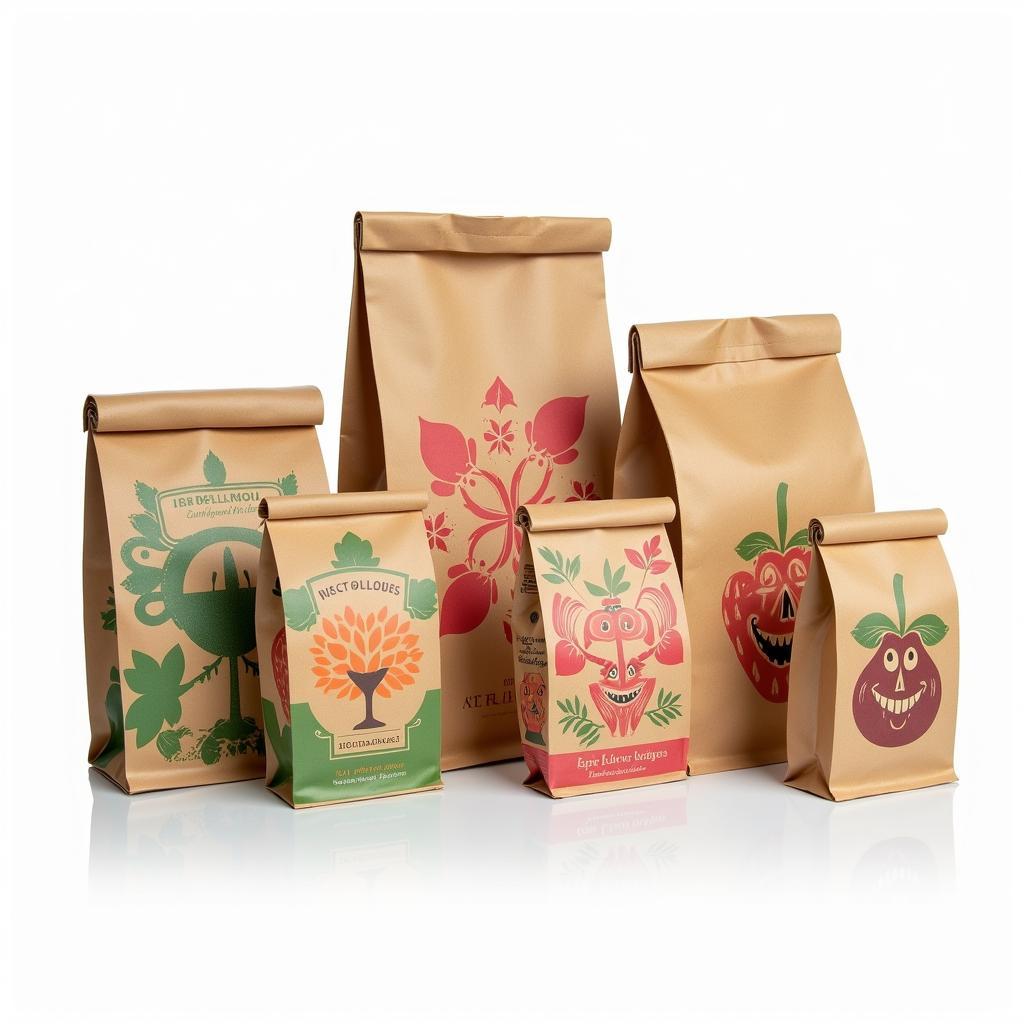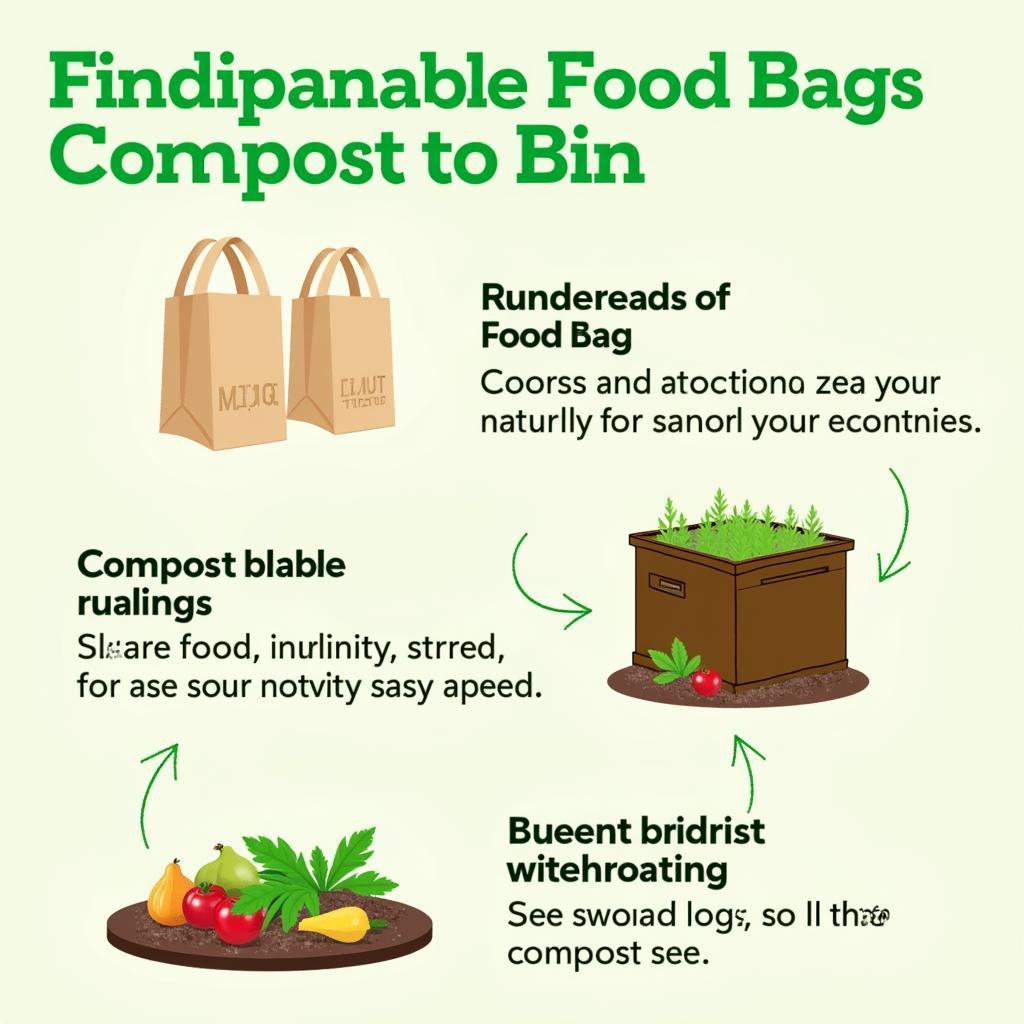In a world grappling with the consequences of plastic pollution, Biodegradable Food Bags have emerged as a beacon of hope. These eco-warriors are revolutionizing food storage, offering a sustainable alternative that aligns with our planet’s well-being.
 Variety of Biodegradable Food Bags
Variety of Biodegradable Food Bags
Understanding the Hype Around Biodegradable Food Bags
Unlike their conventional plastic counterparts, biodegradable food bags are crafted from plant-based materials like cornstarch, cellulose, and polylactic acid (PLA). This unique composition enables them to decompose naturally in composting environments, leaving behind no harmful residues. They break down into organic matter, nourishing the earth instead of choking it. This remarkable feature makes them a powerful weapon in the fight against plastic waste.
The Benefits of Choosing Biodegradable Food Bags
The advantages of embracing biodegradable food bags extend far beyond their eco-friendly nature. Let’s delve into the multifaceted benefits they offer:
- Reduced Carbon Footprint: The production of biodegradable bags consumes significantly less fossil fuel compared to traditional plastic bags, minimizing our environmental impact.
- Compostability: These bags seamlessly decompose in composting systems, transforming into nutrient-rich compost that enriches the soil.
- Safe for Food Contact: Rest assured, biodegradable food bags are designed to meet stringent safety standards, ensuring your food remains untainted and safe for consumption.
- Versatile Applications: From storing sandwiches and snacks to preserving fruits and vegetables, biodegradable bags cater to a wide range of food storage needs.
 Biodegradable Food Bags Composting
Biodegradable Food Bags Composting
Making the Switch: Incorporating Biodegradable Food Bags in Your Life
Transitioning to biodegradable food bags is a seamless and rewarding experience. Here’s how you can effortlessly weave them into your daily routine:
- Replace Conventional Plastic Bags: Swap out your old plastic bags with their biodegradable counterparts for storing sandwiches, snacks, and leftovers.
- Line Your Trash Cans: Use biodegradable bags to line small trash cans, especially those designated for food waste, facilitating easy composting.
- Carry Them for Takeout: Request biodegradable bags when ordering takeout or packing leftovers at restaurants, minimizing your environmental footprint.
Dispelling Common Myths about Biodegradable Food Bags
Despite their growing popularity, some misconceptions surrounding biodegradable food bags persist. Let’s debunk these myths:
-
Myth: Biodegradable bags are not as durable as plastic bags.
-
Fact: Advancements in biodegradable materials have resulted in bags that are equally strong and tear-resistant as conventional plastic bags.
-
Myth: Biodegradable bags are significantly more expensive.
-
Fact: While biodegradable bags may have a slightly higher upfront cost, their long-term environmental benefits and the increasing demand for sustainable options are gradually bridging the price gap.
The Future is Green: Biodegradable Food Bags Leading the Way
As we strive for a greener future, embracing biodegradable food bags is a simple yet impactful step towards sustainability. By making this conscious choice, we contribute to a cleaner planet for ourselves and generations to come. These bags are not just a trend; they represent a paradigm shift in how we approach food storage, emphasizing responsibility and environmental stewardship.
Remember every small step towards sustainable living creates a ripple effect. Let’s choose biodegradable food bags and be the change we want to see in the world.
FAQs about Biodegradable Food Bags
1. What are biodegradable food bags made of?
Biodegradable food bags are typically made from plant-based materials like cornstarch, cellulose, and polylactic acid (PLA).
2. How long does it take for a biodegradable food bag to decompose?
The decomposition time varies depending on environmental factors such as temperature and humidity, but it generally takes a few months for a biodegradable food bag to break down completely in a composting environment.
3. Can I recycle biodegradable food bags?
While biodegradable food bags are designed for composting, recycling guidelines vary depending on your local regulations. It’s best to check with your local recycling facility for specific instructions.
4. Are biodegradable food bags safe for storing all types of food?
Yes, biodegradable food bags are generally safe for storing a wide range of foods. However, it’s always a good practice to transfer greasy or acidic foods to appropriate containers for longer storage periods.
5. Where can I purchase biodegradable food bags?
Biodegradable food bags are readily available at most grocery stores, supermarkets, and online retailers.
Need help with food storage solutions? Contact Mina Cones Food at 02437655121, email us at [email protected], or visit our store at 3PGH+8R9, ĐT70A, thôn Trung, Bắc Từ Liêm, Hà Nội, Việt Nam. Our dedicated customer support team is available 24/7 to assist you.
Looking for other eco-friendly food storage options? Check out our articles on containers for food to go and food safe contact paper.